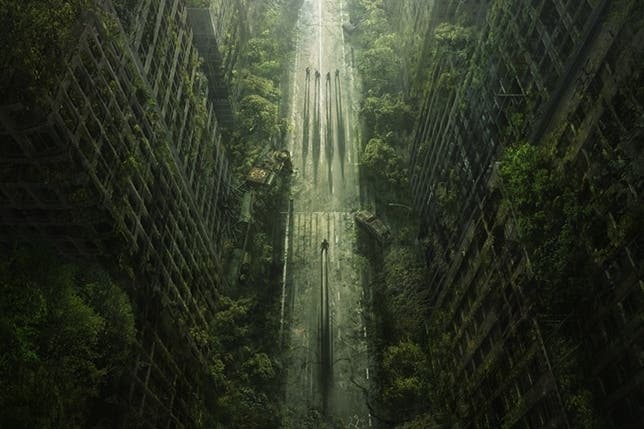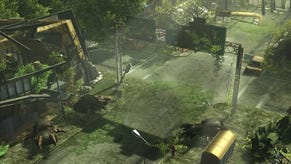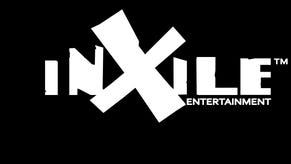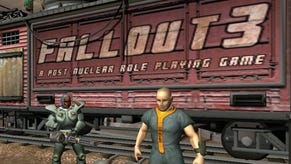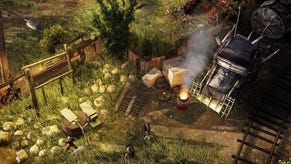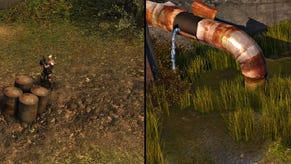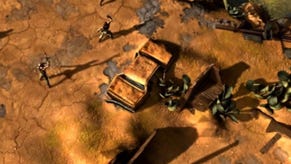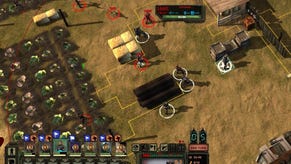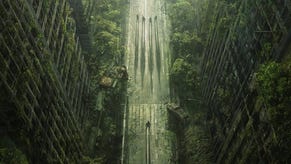"It's kind of funny to be competing with my own franchise"
Brian Fargo on Wasteland 2, Fallout and inXile's crowdfunded future.

Brian Fargo is a name that permeates virtual role-playing. He's touched, influenced or otherwise dabbled with some of the most popular games in the genre, including Fallout. And, of course, the one that started it all: Wasteland.
Now, over 25 years after the release of the original, Fargo is managing production of a new Wasteland game, crowdfunded to the tune of $3m through Kickstarter when Kickstarter was hot and new and incredible, at his California company inXile.
Wasteland 2 launched as a Steam Early Access title late last year in a playable, albeit buggy and incomplete form. It includes a handful of areas set within the post-apocalyptic desert of Arizona in which the player can explore, talk with NPCs, dabble in turn-based combat, complete quests, pick locks, repair toasters...
It's an engrossing experience, one that instantly transports you back to the days when Fallout's camera was isometric, not first-person. It's not finished, but it's full of dark and weird promise. Wasteland 2 is, essentially, the old school Fallout game many detractors of Bethesda crave.
But has it been a success? I ask Fargo over Skype a late January evening for me, an early morning on the west coast of the United States for him.
"There have been all these little steps along the way, marching towards an overall success, which is to make a game everybody loves," Fargo replies, somewhat diplomatically. "That's the main thing we want to do here. The first was doing a Kickstarter. Did it resonate with what we're talking about? Was there interest in our approach and the idea?
"Then as we went each step of the way, here's a screenshot, here's some music, and then we showed a video of early gameplay. Each step of the way it was, with modification, 'you guys are on the right track and we love what you're doing'."
Few have matched inXile's pulling power when it comes to Kickstarter, but, despite the launch of Double Fine's Broken Age, the world still seems unsure whether crowdfunding is helping to produce quality games. And the world still seems unsure whether Kickstarter-funded games can be commercially successful.
And so, we come to Steam Early Access, the new and improved way to release games.
"It doesn't do, like, DayZ numbers, that's for sure," Fargo says of Wasteland 2's sales. "It's been solid. It hit number one in the RPG category for a period of time, and in strategy. So it's done solid numbers. It's not a multiplayer game, so you don't get the same pick-up of, your friends have to buy it too. But it's been a nice, solid success. And it's just more money to polish the game even more. Every time we get money from Kickstarter, from a slacker backer or from Steam Early Access, we just pour it right back into the product."
While Fargo says Wasteland 2 sales haven't "been anything crazy", he seems happy with how things have gone so far. The real indicator of success, he says, will come from sales of the game once it leaves Early Access. "Not a lot of people typically sign up for Early Access for a single-player game, that I've seen, and for that price," he says. "Most people are content on waiting. Most of the comments are, we can't wait to see it when it finally comes out. There are a lot of Early Access games that are less, like $20. We're a very different dynamic."
That price. Wasteland 2 costs £34.99 from Steam Early Access, which is higher than many were expecting. It's one of the most expensive Early Access games, more than double the cost of DayZ, Rust or Starbound.
The price has drawn complaints and, surely, has put people off dipping their toe into the game's dusty expanse. Wasteland 2 is for many a tantalising prospect, but on Steam, where yet another sale always seems around the corner, asking top dollar is sometimes asking too much.
Fargo says his hands were tied. The $55 tier on Kickstarter was the minimum you had to spend to gain access to the game and so, as he explains, it would have been unfair to undermine the support of inXile's early backers by releasing Wasteland 2 on Steam cheaper. "Imagine me doing another Kickstarter after sending the signal that, by the way, if you support us early on, we're going to undercut you later," he says.
"You have these different groups of people. We have the new audience and then we have my Kickstarter audience. They both have different dynamics. If you didn't know the backstory you might say, gosh, why are you charging so much for it? But when you know the backstory you understand."
Fargo extends his defense by saying Wasteland 2 offers bang for your buck. It'll end up being a big game, he says, and the current build offers not even a third of the game. As someone who has put 20 hours into Wasteland 2 so far, I'm excited by the prospect - if it rings true.
Still, Wasteland 2 will get cheaper. It'll launch proper under that hefty £34.99 price tag. Many are happy to wait, missing out on the digital extras the Early Access offers. That, for Fargo, is okay. "If you don't want to pay that you don't have to." When Wasteland 2 comes out of beta, when it launches proper, that'll be the real test of success.
"It's been a nice, solid success. And it's just more money to polish the game even more. Every time we get money from Kickstarter, from a slacker backer or from Steam Early Access, we just pour it right back into the product."
InXile took Christmas off, like many of us did, to recharge its batteries. It returned to action in January faced with 7000 bugs, comments and suggestions to sift through. The Early Access is doing what it's supposed to do: offer the developer feedback and help make a better game. But that's a blessing and a curse.
The new work is feeding into a major update that is due out soon. Fargo promises a "tremendous amount of change", pointing to improved AI behaviour (currently the AI is rudimentary in combat). When players first enter the Highpool area, it triggers a mundane combat encounter. Enemies, as they do throughout the alpha, appear content to run toward you as quickly as possible, eating bullets to the face in the process. The update will give enemies the ability to climb ladders to assume sniper positions, among other, smarter, plays. We'll also see the addition of destructible objects and crouch positions, adding an additional layer of strategy to combat. "One of the biggest demands," Fargo teases, "they loved in Fallout that you could take targeted shots. Well, you know what? We might be able to do that. We're taking a look at that."
Elsewhere, the inventory user interface has received a makeover. There's more on this on the Kickstarter page, but as Fargo admits, "it could use a little bit of refinement". That's an understatement. Wasteland 2's inventory is currently a clunky, befuddling mess. Using it is like frantically fishing around your bag for your keys. In the dark. And, it turns out, your keys aren't even there. "There will be big changes there," Fargo promises.
All welcome, but I'm most looking forward into the improvements inXile says are being made to Wasteland 2's narrative. This seems odd to me, and when Fargo first mentions it, I'm sceptical. This is an RPG after all. I'm invested because of the promise of choice and consequence, the video game version of a choose your own adventure. If I say this, here, then this, here, is affected. My decisions make my playthrough unique. My decisions determine my fate. Now the game is nearing release, how much of the narrative, the lifeblood of the game, can change?
"The initial response was that stuff's locked and loaded," Fargo says. "They assumed we were going to adjust combat and balance, but they didn't really believe we were going to make these wholesale changes and additions to the existing content.
"I don't mean just dropping in an area, but things that ripple through the entire world. That to me is the biggest focus."
Fargo uses the Rail Nomad area as an example. He wants it to feel more like a HUB, with hustle and bustle, missions to accept and many more NPCs to chat to. Right now it's a somewhat sparse expanse, with the odd interesting conversation dotted around the map. That's going to change when the update is pushed live.
Looking further down the road, Wasteland 2 is nearing completion and launch proper. Fargo won't commit to a date, or even a month, no matter how hard I press him, but he does say inXile is "in the home stretch". Late game maps are playable, and, in terms of functionality, the game is complete. Fargo will say this: Wasteland 2 will launch in 2014. "Oh absolutely. No question of that."
"I often have to remind my people that we're not in the triple A business here. That's not what we can do. On the other hand, I can't help myself by wanting to do games that have some kind of epic scale to them."
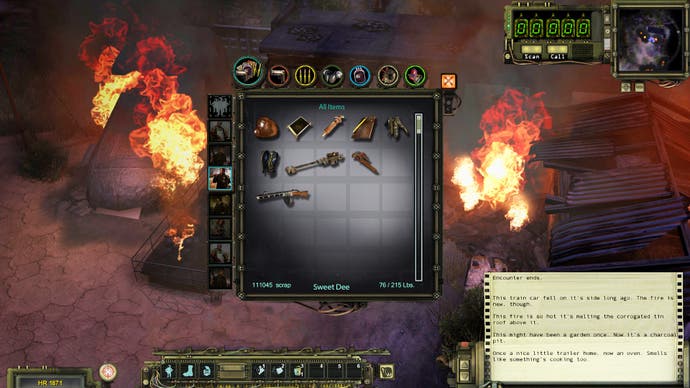
InXile is at the time of publication 27 employees. 24 of those are working on Wasteland 2. Some are rolling onto Torment, the company's second successful Kickstarter-fuelled game (that made an incredibly $4.1m. In total, including contractors, Wasteland 2 is a 30 person project.
It's a modest number compared to today's triple-A team sizes, and significantly lower than the number of people it took to make 2011's action role-playing game Hunted: The Demon's Forge for PC, PlayStation 3 and Xbox 360. But I get the impression inXile is better off streamlined and making a more manageable experience.
"I had to completely rethink what it took to make a game for the budget we had," Fargo says. "I often have to remind my people that we're not in the triple A business here. That's not what we can do. On the other hand, I can't help myself by wanting to do games that have some kind of epic scale to them and have all the depth and nuance and subtlety and variance.
"The last thing I want to do is make a game where whatever you've seen in the first three hours is the same thing you see in the last three hours. You're constantly encountering new types of enemies, new types of environments and new types of strategies. From beginning to end it's never the same."
Fargo says that through clever use of the Unity asset store and outsourcing specific jobs to contractors situated across the globe he's been able to create what will amount to a roughly 50 hour game on a budget. "We prioritise," he says. "We're super efficient. We were very clever about the way we approached it."
Fargo has alread pulled animators, environment artists and writers away from Wastleland 2 and onto Torment, but now programmers are starting to move across to work on levels. This, he says, makes the second game "very tangible". "I suspect in the next months from now is there will be a small team left on Wasteland continuing to keep the content fresh and make changes and additions and also helping do the mod kit, and then everybody else will be on Torment," he predicts.
Fargo lights up: "It's great when you have pre-production without the overhead attached. That way they can take their time, hone it in, craft it, argue about word choice for a week if they want, and then, boom, the production team starts and they're working on something that's truly been thought through."
"I don't think we'll be talking with Bethesda."
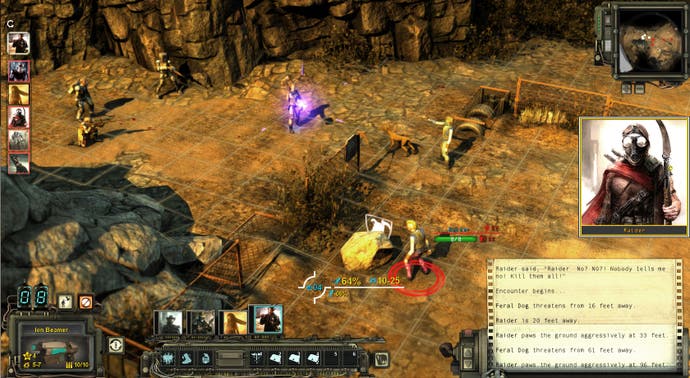
Fargo seems content with the way inXile works these days. He seems happy making role-playing games and happy funding them with Kickstarter. And why not? It's worked wonderfully well for the company, twice. Who's to say it won't work again for another project? At the very least, Fargo says crowdfunding will tell him whether his next new idea is a good one, whether, as he puts it, gamers are "jazzed" about it. Or not. Crowdfunding is unforgiving like that.
"Some people say, well, if you're successful you shouldn't have to use it," Fargo ponders. "But the way I think about it is, if each time we do one and we deliver and all you did was get a game for much less than you would have otherwise, it ends up being a win for everyone anyway."
What is unlikely is that inXile will get involved in publisher-funded console development again, after what sounds like a disturbing experience making Hunted for Bethesda. This, I think, is a shame, because if the Fallout rights owner ever decided to greenlight a game in the series created in the old-school style, or perhaps gave the thumbs up to a remake of Fallout 1 or 2, I can't think of a better developer than inXile for the job. Fargo, after all, founded Interplay and co-created the series.
"I don't think we'll be talking with Bethesda," Fargo counters, his voice for the first time losing that enthusiastic kick I've been enjoying for the past half hour.
Why not?
"We had a tough relationship with them.
"It's kind of funny to be competing with my own franchise."
I press.
"They're very successful and they do some very high quality products. They have a very different attitude towards development than what I'm used to. I'm sort of more... if you think of a film, every director has his or her own way of doing things, no matter what. There's no cookie cutter for their approach. And that's what makes films so great: you have these wildly different approaches. I had my own approach and they have a structured way of doing it that's just different than mine."
This past bad experience of course has to do with Hunted, a game that promised much but failed to deliver both critically and, crucially for Bethesda, commercially.
"That was the only time I did business with them, yeah," Fargo says. Don't hold your breath for a sequel.
And - perhaps unsurprisingly - don't hold your breath for an inXile-developed Fallout, either.
"Yep. Very unlikely."
We'll have to do with Wasteland 2, then, which is no bad thing. As the game nears completion, I'm looking forward to testing its new systems. I'm looking forward to talking with new NPCs and travelling to new areas. And I'm looking forward to exploring post-apocalyptic Los Angeles, which is sure to freshen things up.
"It's just wildly different and weirder than Arizona," Fargo says. "You're dealing with a bunch of cults and factions and more heavily populated areas. It's just very different and creepier. And you're dealing with a lot of synths and robots. It just takes on a whole other weird, darker tone. It's really great."
Fargo's struggle to make Wasteland 2 is well documented. His Kickstarer pitch video discussed the many failed meetings he had with publisher executives. EA, Microsoft and more turned the game down, for a variety of reasons. We already have an RPG was a common response. We already have BioWare was EA's.
It was a frustrating time, but Fargo is philosophical about the experience. Indeed, he considers himself lucky that every publisher he spoke with passed on the game. Perhaps, when all is done and dusted with Wasteland 2, its backers will feel the same.
